Share
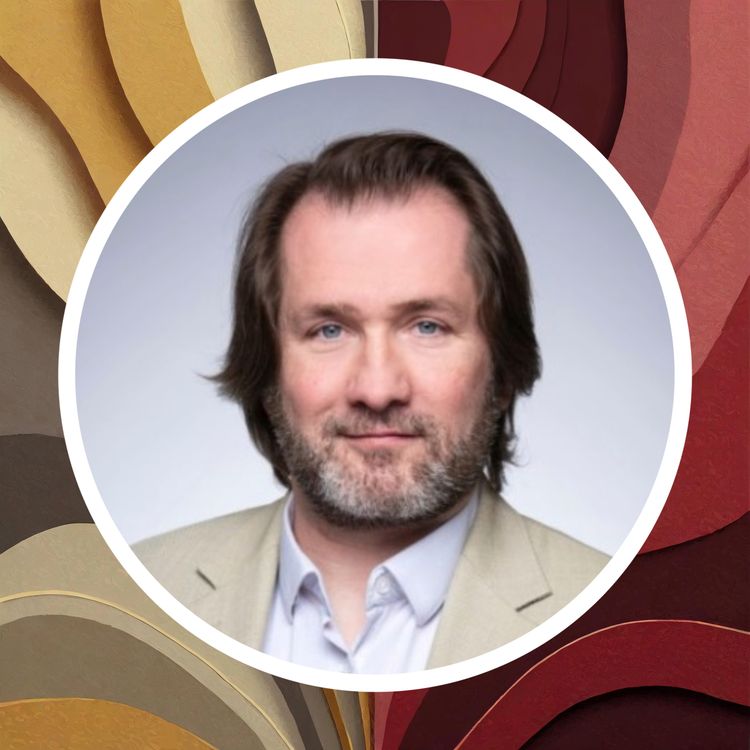
Deep Learning Dialogues
Serious Fun: Why Joy Matters in Modern Education
In this illuminating episode, we sit down with Emmanuel Duplàa from the University of Ottawa, who challenges us to rethink what we know about teaching and learning in the age of AI. Moving beyond the traditional classroom model, Professor Dupla shares his revolutionary perspective on why joy isn't just beneficial for learning—it's essential. From discussing how to embrace chaos in the classroom to exploring why we need to "sell interaction, not content," this conversation offers fresh insights into education's future. Whether you're an educator grappling with AI tools, a parent interested in modern learning approaches, or someone passionate about educational innovation, this episode offers practical wisdom about transforming education through the power of authentic learning and "serious fun." Discover why releasing control might be the key to better learning outcomes and how embracing uncertainty could be the antidote to teacher burnout.
Emmanuel Duplàa is the Director of Professional Development at the Faculty of Education at the University of Ottawa. He is a professor specialized in information and communication technology (ICT) for learning. After completing a BA in mathematics and a master's degree in cognitive sciences and artificial intelligence, he completed a PhD in education on the unconscious dimensions of online relationships in the context of e-Learning. He participated in different projects on ergonomic design and planning (Institut de Recherche en Informatique et Automatique), on e-learning (Télécom-Paristech and Centre d'Études Supérieures Industrielles) and training aspects of e-Health (TÉLUQ). He is currently conducting research at the Faculty of Education on educational video games, on intergenerational learning, on digital literacies and on design processes in e-learning. Professor Duplàa is a Learning Committe Lead with the LIFE Research Institute.
You can find Emmanuel at:
Email: eduplaa@uottawa.ca
Feedback? You can ask your questions or give us feedback on the show here
Want to know more? You can check out our: WCDSB GenAI Guidelines, infographics, and Innovation website: https://innovate.wcdsb.ca/
Want to know more?
You can check out our: WCDSB GenAI Guidelines, infographics, and Innovation website: https://innovate.wcdsb.ca/
Feedback? You can ask your questions or give us feedback on the show here
Want to get in touch? Contact Katrina & Whitney by email at: katrina.gouett@wcdsb.ca and whitney.mckinley@wcdsb.ca or on LinkedIn
More episodes
View all episodes
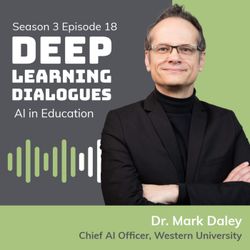
18. Why We Still Teach the Basics When AI Can Do It All
28:32||Season 3, Ep. 18This episode of Deep Learning Dialogues explores the seismic shifts in education and global power triggered by the "step change" in agentic AI. Dr. Mark Daly introduces the "Tower of Abstraction," a metaphor for how technology evolves to hide complexity, and argues that teaching foundational skills like coding and essay writing remains essential, not for the final product, but to build the mental "muscles" required to think and structure logic. The conversation moves from the classroom to the global stage, framing "compute" as a strategic national resource akin to oil or steel and highlighting Canada’s potential as an energy and AI superpower. Ultimately, Daly offers a deeply optimistic vision for the future of K-12 education: as machines automate cognitive labor, the human "value proposition" shifts from being "smart" to being kind, authentic, and connected through the arts and community. You can read the full article summary here.Dr. Mark Daley is Western University’s first-ever Chief AI Officer and a Scholar in Residence in AI at NSERC. A respected researcher in neural computation, his career includes serving as Vice-President Research at CIFAR, where he helped lead Canada’s national AI strategy. Mark is a remarkably multidisciplinary scholar, holding cross-appointments in departments ranging from Computer Science and Biology to Epidemiology and Biostatistics. A frequent "guiding voice" for educators , he is known for his early clarity on why AI detection is mathematically impossible and for his Substack, Noetic Engines, where he explores the intersection of technology and humanity. Recently trained in international mediation in Paris , Mark combines high-level executive leadership with a deep commitment to helping students find "mattering" and purpose in an automated world.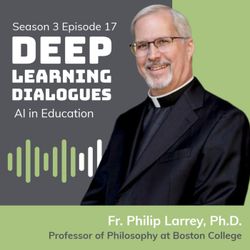
17. The Alignment Problem: Bridging the Gap Between Tech and Tradition
42:42||Season 3, Ep. 17In this episode of Deep Learning Dialogues, hosts Whitney McKinley and Katrina Gouett explore the complex intersection of artificial intelligence and human values with Father Philip Larrey. Under the title "The Alignment Problem: Bridging the Gap Between Tech and Tradition," the conversation delves into the philosophical distinction between a machine's ability to "select" and a human's capacity to "choose". Father Larrey shares insights from his extensive work with Silicon Valley leaders and the Vatican, addressing critical issues such as the "black box" of AI decision-making, the ethical implications of the European AI Act, and how ancient wisdom from thinkers like Aristotle can provide a necessary framework for navigating the future of generative AI. Read the summary here.Fr. Philip Larrey, Ph.D., is a Catholic priest and professor of philosophy at Boston College, where his work focuses on the philosophy of knowledge and the impact of the digital era on society. He previously spent over 20 years in Rome, serving as the Chair of Logic and Epistemology and Dean of the Philosophy Department at the Pontifical Lateran University in the Vatican. As the chairman of Humanity 2.0—a non-profit collaborating with the Vatican to promote human flourishing—he is a leading voice in global discussions on AI ethics and has authored several influential books, including Connected World and Artificial Humanity. Based in Boston, Fr. Philip continues to engage with industry giants and international organizations like the United Nations to bridge the gap between technological advancement and ethical responsibility.Find more information about Father Philip Larrey:https://philiplarrey.com/ LinkedIn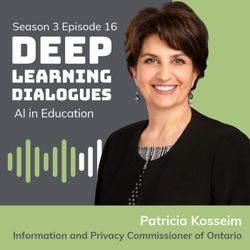
16. Navigating EDSTA: A New Era of Digital Security in Ontario Schools
46:27||Season 3, Ep. 16In this episode, Patricia Kosseim discusses the landmark Enhancing Digital Security and Trust Act (EDSTA). The conversation explores the shifting landscape of student privacy in the age of generative AI. Commissioner Kosseim shares use cases regarding unauthorized "Shadow AI" and offers a roadmap for educators to empower students with the data hygiene skills necessary to navigate a transparent digital future. You can read the article here.Patricia Kosseim is the Information and Privacy Commissioner of Ontario. She is a lawyer by profession and has extensive experience as a senior executive working in complex, inter-disciplinary environments, across public, private and health sectors. Through integration of legal practice, public policy and academic research, she has led large teams and major strategic initiatives to address ethical, legal and social implications of emerging technologies. She connects people and creative ideas to advance critical reflection, converge around common goals and work towards practical solutions. In March 2025, she was awarded the King Charles III Coronation Medal, in recognition of her valuable contribution to Ontario and to Canada.Find further information at:ipc.ca Instagram: https://www.instagram.com/ipc.ontario/Resources Mentioned:2025 Global Privacy Enforcement Network sweep focuses on the protection of children’s privacyPrivacy Pursuit! Lesson PlansA Guide to Privacy and Access to Information in Ontario SchoolsDigital Privacy Charter - 12 commitments supporting teachers and studentsYouth ambassador tool kitYouth advisory council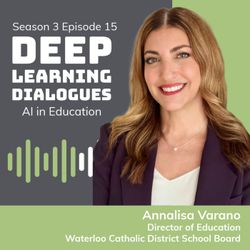
15. The Heart of the Classroom: WCDSB’s Faith-Based Vision for Student-Centered AI
40:04||Season 3, Ep. 15In this episode of Deep Learning Dialogues, WCDSB Director of Education Annalisa Varano explores the intersection of faith, leadership, and generative AI within the Waterloo Catholic District School Board. Adopting a human-centered vision, Varano emphasizes that AI is a tool designed to enhance the sacred relationship between educators and students. The conversation delves into how WCDSB uses Catholic Social Teachings as a "litmus test" for new technology, ensuring every innovation honors human dignity, promotes the common good, and fosters equity. From reimagining authentic assessments to leveraging AI for administrative efficiency, Varano outlines a strategic roadmap where technology serves the mission of the "whole child," grounding the board’s upcoming Multi-Year Strategic Plan in the pillars of learning, serving, and belonging.You can read the full episode summary here.Annalisa Varano is the Director of Education for the Waterloo Catholic District School Board, bringing over 27 years of distinguished experience in Catholic education to the role. Her extensive career includes 23 years with the Simcoe Muskoka Catholic District School Board and global teaching experience in Australia and South Korea. A former President of the Catholic Principals’ Council of Ontario, she has led at the provincial level and overseen diverse portfolios including K–12 student success, virtual learning, and experiential programming. Annalisa is a practicing Catholic and strategic leader dedicated to navigating the future of education through a lens of discernment, equity, and innovation.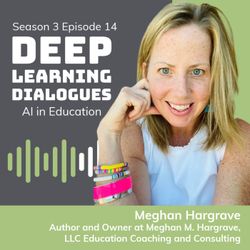
14. From AI Aware to AI Fluent: Practical Steps for Educators
01:00:51||Season 3, Ep. 14In this episode of Deep Learning Dialogues, hosts Whitney McKinley and Katrina Gouett explore the practical steps required for educators to move from being "AI aware" to "AI fluent". Guest Meghan Hargrave discusses how to bridge the digital divide by integrating generative AI into K-12 classrooms with a focus on purpose and pedagogy rather than just buzzwords. The conversation covers actionable strategies for using AI as a "thought partner" for tasks such as creating formative assessments and brainstorming for Professional Learning Communities (PLCs). Listeners will also learn about the importance of establishing a shared language for AI use within school systems and maintaining a balance between technology and the development of students' authentic personal voices.Read the full summary here.Meghan Hargrave is an educational consultant, coach, and former teacher who specializes in literacy and instructional practices. She is the owner of Meghan M. Hargrave, LLC, where she works with K-12 schools and systems to translate complex research and board demands into practical classroom strategies. As an expert in educational technology, Meghan is the co-author of The Artificial Intelligence Playbook and Teaching Students to Use AI Ethically and Responsibly. Her work focuses on helping educators and caregivers navigate the noise of modern educational technology to support student learning through purposeful, research-grounded tools.You can find Meghan on LinkedIn, Instagram @letmeknowhowitgoes and on her website https://www.meghanhargrave.com/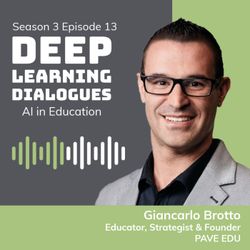
13. Encountering AI with a Moral Compass: Faith, Ethics, and Education
48:41||Season 3, Ep. 13In this episode of Deep Learning Dialogues, hosts Whitney McKinley and Katrina Gouett engage with Giancarlo Brotto, an educator and AI advocate, to explore the intersection of education, artificial intelligence, and ethics. They discuss the importance of viewing AI as a gift that should serve humanity, the varying perspectives of students and educators on AI, and the need for moral discernment in its use. The conversation emphasizes the role of educators in guiding students through the complexities of AI, the necessity of integrating AI into the curriculum, and the importance of vulnerability and co-learning in the classroom. Brotto calls for a collective effort to ensure that faith-based institutions lead the way in navigating AI's challenges and opportunities.Giancarlo Brotto is a dynamic Canadian educator, strategist, and keynote speaker with over two decades of experience helping schools and ministries harness technology to better serve students. A former university and secondary mathematics teacher, he transitioned into leadership roles and founded PAVE EDU, a company that guides school systems, governments, and businesses through AI adoption. His work focuses on preparing educators and families to thrive in an AI-infused world by grounding innovation in ethics and social-emotional learning. Within the Catholic community, he is known for his presentation Navigating Faith and Wisdom, where he encourages using a moral compass to encounter AI as a gift that aligns with Catholic social teachings.You can find Giancarlo on LinkedIn and Instagram.Show Links:Encountering Artificial Intelligence pdfhttps://paveedu.org/ http://aireadyschools.ca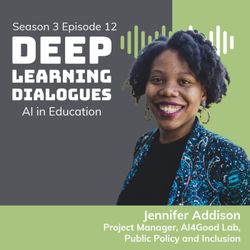
12. Redefining Tech Education: Inside Mila’s AI for Good Lab
36:45||Season 3, Ep. 12In this episode, hosts Katrina Gouett and Whitney McKinley welcome Jennifer Addison, Project Manager for the AI for Good Lab at Mila, Quebec’s artificial intelligence institute. Jennifer details the lab’s mission to equip women and gender-diverse individuals with the skills to build machine learning projects, fostering a more inclusive tech culture and inspiring leaders to use AI for social good. The conversation explores the power of curiosity-driven learning and the importance of creating safe, grade-free environments where students feel empowered to ask questions, collaborate rather than compete, and challenge the status quo. They also discuss how K-12 educators can adopt these principles by becoming co-learners alongside their students to navigate the evolving AI landscape together.Jennifer Addison is the Project Manager for the AI4Good Lab at Mila - Quebec Artificial Intelligence Institute. The Lab is a 7-week program that equips women and gender diverse people with the skills to build their own machine learning projects. The program is designed to open doors for those who have historically been underrepresented in the AI industry, contribute to a more inclusive and diverse tech culture and to inspire the next generation of leaders to use AI as a tool for social good.Prior to Mila, Jennifer worked in Human Resources at the Business Development Bank of Canada where she contributed to the development and advancement of the corporate Diversity, Equity, Inclusion and Accessibility strategy. With over a decade of experience in the non-profit sector, in the US and Canada, she specializes in developing and implementing programs designed to address and disrupt structural inequities and discrimination experienced by equity-deserving communities.You can find Jennifer on LinkedIn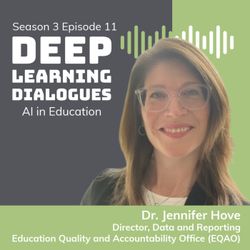
EQAO’s Human-Centered Approach to Artificial Intelligence
40:58|In this week’s episode of Deep Learning Dialogues, hosts Whitney McKinley and Katrina Gouett are joined by Dr. Jennifer Hove, Director of Data and Reporting at EQAO, to navigate the complex intersection of artificial intelligence and large-scale assessment. Dr. Hove outlines the agency’s "slow and steady" roadmap to AI adoption, emphasizing a human-centered framework where Ontario educators remain the primary drivers of assessment creation and scoring. The conversation explores how EQAO is looking to leverage technology for quality assurance rather than replacement , the challenges of maintaining academic integrity in a digital landscape , and the rigorous review processes ensuring fairness, validity, and bias mitigation. Tune in for an insightful look at how EQAO is building public trust and preparing for the future of education while keeping student equity at the forefront.Dr. Jennifer Hove is the Director of Data and Reporting at EQAO, where she oversees the agency's psychometrics, data science, research, and IT teams to drive digital transformation and generate actionable educational insights. With over two decades of experience spanning academia, government, and the K-12 sector, Dr. Hove is a recognized leader in educational measurement and assessment analytics. She and her colleagues are two-time winners at the International eAssessment Awards, and she currently serves as a board member for the International e-Assessment Association.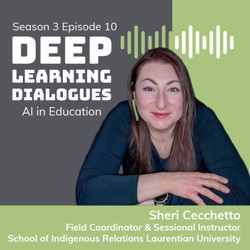
10. Walking Quietly with AI: Medicine Wheel Teachings for Ethical Tech
29:51||Season 3, Ep. 10In this conversation, we explore how Indigenous governance and cultural frameworks can guide ethical technology use in education. Sheri Cecchetto introduces the Medicine Wheel as a holistic lens for approaching AI in K–12 classrooms—emphasizing reflection, relationship-building, and responsibility over speed and profit. Together, we unpack themes of digital sovereignty, environmental impact, and the importance of slowing down to make intentional choices about technology. This episode challenges educators to rethink AI literacy by centering Indigenous values and collective care.Sheri Cecchetto is Anishinaabe Kwe from Wabigoon Lake Ojibwe Nation and a field coordinator and sessional instructor in the School of Indigenous Relations at Laurentian University. Her work focuses on Indigenous social work, emergent learning, and decolonizing education. A passionate advocate for Indigenous governance and digital sovereignty, Sherri brings a unique perspective on how cultural teachings can inform ethical AI use. Beyond the classroom, she is an avid beadworker whose art reflects her deep connection to land and community.You can find Sheri on LinkedInLink to "Theory of Water" by Leanne Betasamosake Simpson